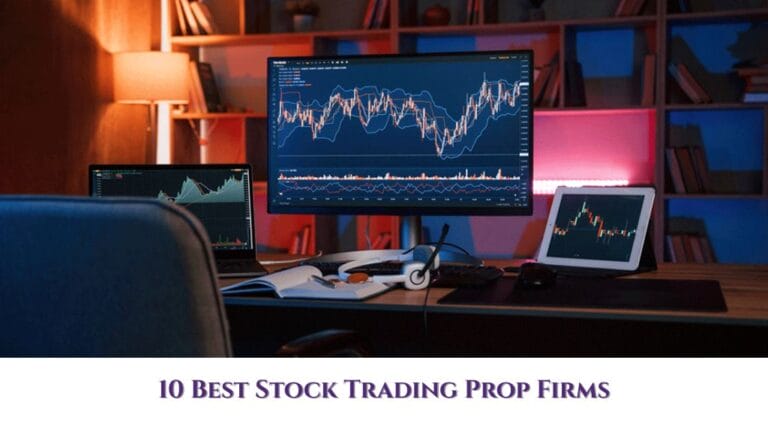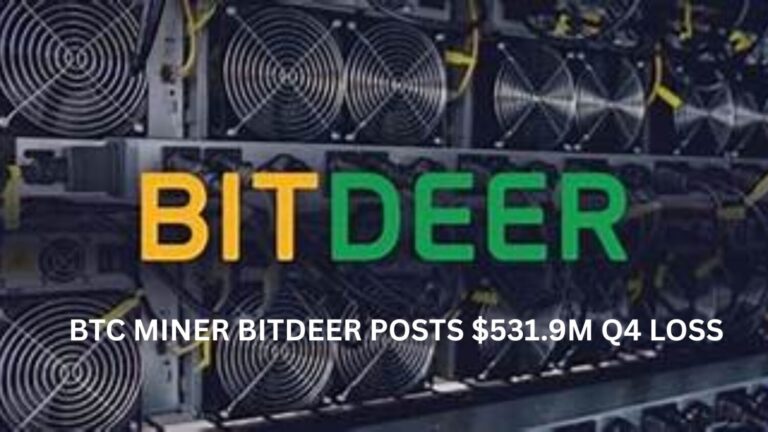Table of Contents
So so so, as we always do, let’s start with the basics, what is trading?
Before diving into “Monitors”, Trading, in simple terms, is the act of buying and selling things with the goal of making a profit. It’s like when you trade your toy with a friend’s toy, but on a bigger scale. In the world of finance, trading usually involves things like stocks (which are like pieces of a company), currencies (money from different countries), or even goods like gold or oil. Traders try to buy these things when they think their value will go up and sell them when they think the value will go down. By doing this, they hope to make money by selling at a higher price than they bought. But it’s important to remember that trading can also involve risks, as values can go down too, and traders might end up losing money.
But, what is the role of “Monitor” in trading? ????
Essentially, A Good Monitor = A Good Trader, Well yes but actually no, but it might give you an upperhand.

In trading, a monitor plays a crucial role as it provides traders with the ability to access and monitor various aspects of the financial markets and their trading activities. Here’s a breakdown of the role of a monitor in trading:
- Market Analysis: Traders use monitors to observe real-time market data, such as stock prices, currency exchange rates, commodity prices, and more. By having multiple monitors, traders can simultaneously track different assets and markets, helping them analyze trends and make informed decisions.
- Data Visualization: Monitors allow traders to display charts, graphs, and other visual representations of market data. These visuals help traders identify patterns, trends, and potential opportunities or risks. Different charts, timeframes, and technical indicators can be displayed on different screens for quick analysis.
- Order Placement: Traders use monitors to access trading platforms where they place orders to buy or sell assets. Monitors enable traders to monitor their open positions, review pending orders, and execute trades quickly when they see favorable conditions.
- News and Information: Financial news and information play a significant role in trading decisions. Traders use monitors to stay updated with news that could impact markets, such as economic reports, company earnings, geopolitical events, and more. Having dedicated screens for news feeds helps traders react to breaking developments promptly.
- Multi-Asset Tracking: Many traders are involved in multiple markets and asset classes. Monitors provide the ability to track different asset types simultaneously, such as stocks, bonds, commodities, and cryptocurrencies, allowing traders to diversify their trading strategies.
- Technical Analysis: Traders often use technical analysis to forecast future price movements based on historical market data. Monitors enable traders to perform technical analysis efficiently by displaying various chart patterns, trendlines, and indicators side by side. [How to Trade in a specific pattern?]
- Risk Management: Monitoring risk is crucial in trading. Traders can use one screen to track their portfolio’s overall performance and risk exposure. They can also monitor stop-loss levels and quickly exit positions if the market moves against them.
- Execution Speed: In fast-paced markets, speed is essential. Traders use monitors to execute trades swiftly, as delays can lead to missed opportunities or unfavorable outcomes.
- Customization: Traders can customize their monitor setup to fit their preferences. They might arrange screens to have a clear view of specific data, use hotkeys for quick actions, and set up alerts for specific conditions.
- Research: Traders often need to perform research on the assets they are trading. Monitors provide a space to access news articles, research reports, and other resources that help traders make well-informed decisions.
Yeah, that’s all, kind of ????
The Main Agenda –
Best Monitors for Trading ➣

So, on what basis do you think should we judge our monitors for trading?
When evaluating a monitor for trading purposes, there are several qualities to consider that can significantly impact your trading experience and effectiveness. Here are the key qualities to judge a monitor for trading:
- Screen Size and Resolution
- Color Accuracy and Contrast
- Refresh Rate
- Response Time
- Panel Type
- Ergonomics
- Connectivity
- Aspect Ratio
- Bezel Size
- Flicker-Free and Blue Light Filter
- Energy Efficiency
- Adjustable Color Temperature
- Compatibility with Trading Software
- Price
So yeah, we have judged on the same basis and here are the results!
Dell U3821DW UltraSharp Curved USB-C Hub Monitor
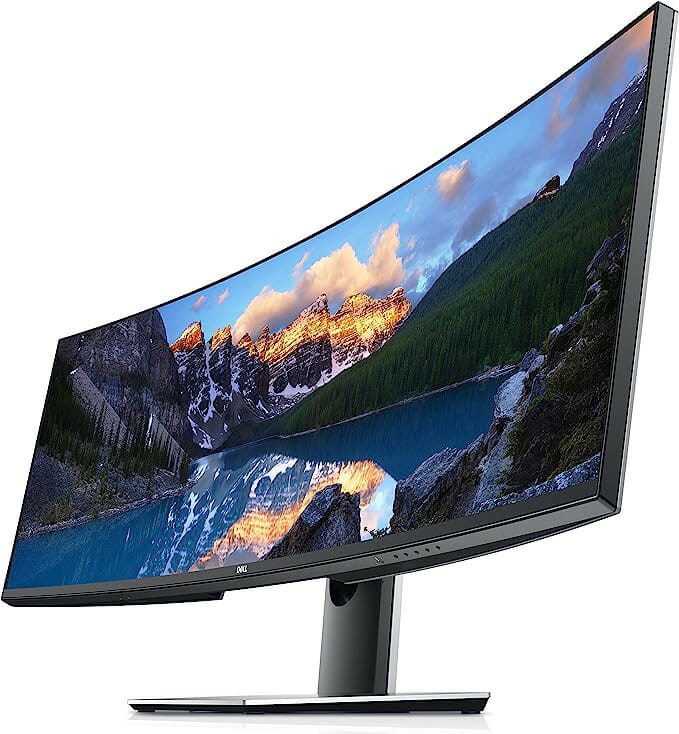
Price: $1389.99
The Dell UltraSharp U4919DW is a 49-inch dual QHD curved monitor that offers an expansive and immersive display for trading purposes. With its dual QHD resolution (5120×1440), this monitor provides ample screen real estate for traders to analyze multiple charts, data feeds, and financial information side by side.
The curved design enhances the viewing experience and reduces distortion at the edges. The monitor comes with versatile connectivity options including HDMI, DisplayPort, USB downstream and upstream ports, and USB Type-C for seamless connectivity with various devices. This monitor’s spacious display and curvature can aid traders in gaining a comprehensive view of market trends and patterns.
Pros: Dual QHD resolution, curved design for immersion, multiple connectivity options, large screen for multitasking.
Cons: 8ms response time might not be ideal for fast-paced trading environments where quick data updates are crucial.
Also Read ➤➤ What are the Best Mobile Crypto Games to play?
SAMSUNG 49″ Odyssey Neo G7 4K UHD 165Hz 1ms G-Sync 1000R Curved Gaming Monitor
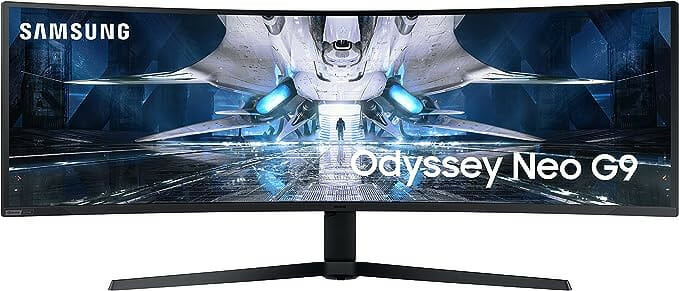
Price: $1211.99
The SAMSUNG Odyssey Neo G9 G95NA is a 49-inch gaming monitor that can also cater to trading needs due to its impressive features. With a 4K UHD Mini LED display, a high refresh rate of 240Hz, and a quick 1ms response time, this monitor ensures smooth motion and minimal input lag, which can be advantageous for real-time trading data updates.
The curved screen enhances immersion, making it easier for traders to stay engaged with market movements. It supports both G-Sync and FreeSync Premium Pro, which reduces screen tearing and improves visual quality. While gaming-oriented, this monitor’s high resolution and fast refresh rate can be beneficial for traders who require quick and accurate data representation.
Pros: 4K UHD Mini LED display, high refresh rate of 240Hz, G-Sync and FreeSync support, curved screen for immersion.
Cons: Advanced gaming features might be unnecessary for traders, potentially leading to a higher price point.
ASUS ROG Swift PG32UQR 32” 4K HDR 144Hz DSC HDMI 2.1 Gaming Monitor

Price: $999
The ASUS ROG Swift PG32UQR is a 32-inch gaming monitor that offers features suitable for trading applications as well. With a 4K UHD resolution (3840 x 2160), IPS panel, and a 144Hz refresh rate, this monitor provides crisp visuals and smooth motion. The Display Stream Compression (DSC) technology allows it to achieve a high refresh rate without sacrificing resolution, ensuring that traders can view data updates and charts with precision.
The monitor is G-SYNC compatible, reducing screen tearing and enhancing the visual experience. The Extreme Low Motion Blur Sync feature minimizes motion blur, crucial for tracking fast-changing market trends. Additionally, the monitor incorporates Eye Care technology to reduce strain during prolonged use. The DisplayHDR 600 certification ensures vibrant colors and improved contrast.
Pros: 4K UHD resolution, high refresh rate with DSC, G-SYNC compatibility, Eye Care technology, DisplayHDR 600 certification.
Cons: The relatively smaller 32-inch screen might limit the number of charts and data that can be displayed simultaneously.
Also Read ➤➤ What are the Trading Signals?
LG 34WK95U-W 34″UltraWide 5K Nano IPS LED Monitor
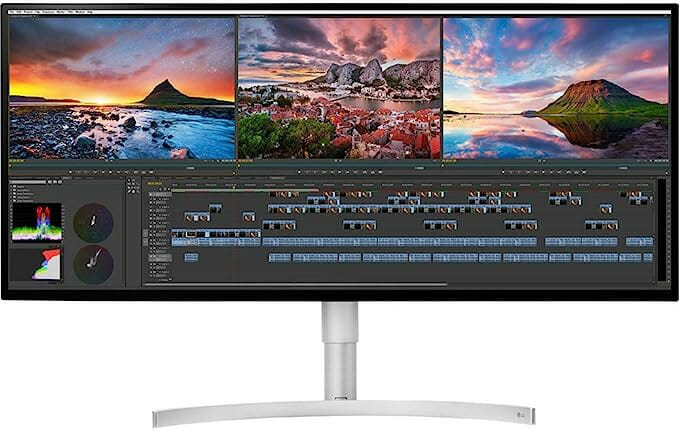
Price: $1090.00
The LG 34WK95U-W is a 34-inch UltraWide monitor with a 5K resolution (5120×2160) that provides ample space for traders to view multiple charts and data feeds side by side. The Nano IPS panel delivers accurate and vibrant colors, enhancing the readability of financial information.
The built-in speakers add convenience for receiving audio alerts or news updates. The monitor’s large screen size combined with its 21:9 aspect ratio makes it ideal for multitasking, and its high resolution ensures that traders can view intricate market details. On the downside, the refresh rate is not as high as some gaming monitors, which could affect the real-time representation of fast-moving data.
Pros: UltraWide 5K resolution, Nano IPS panel for accurate colors, built-in speakers, large screen for multitasking.
Cons: Refresh rate not as high as some gaming monitors, potential limitations in motion fluidity for fast data updates.
Thinking about subscribing to a newsletter? ➤➤ Best Newsletters for Traders
BenQ EW3280U Premium Monitor
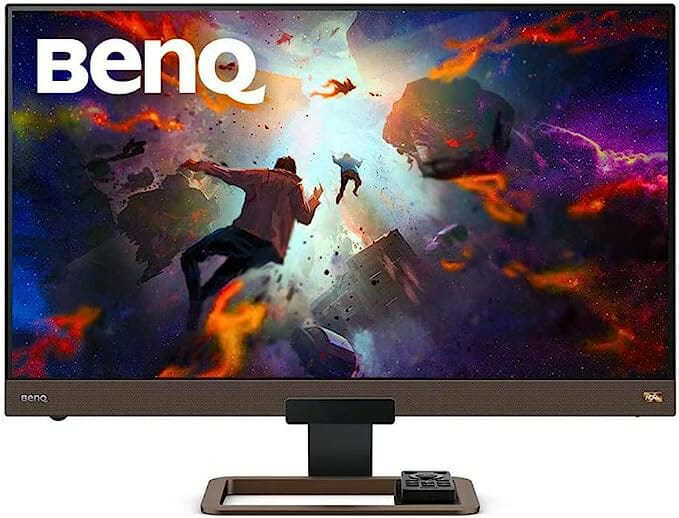
Price: $649.99
It has an amazing viewing angle, making it suitable for analyzing charts and graphs. The monitor features HDRi technology, which combines HDR and intelligent ambient light sensors to optimize the display’s brightness and color saturation. This can help traders view charts in varying lighting conditions.
Adaptive Brightness automatically adjusts brightness based on the content, further reducing eye strain. The inclusion of a 2.1-channel speaker system with a 5W subwoofer can provide audio alerts for important market events. The monitor’s USB-C, HDMI, and DisplayPort connectivity options add flexibility for connecting various trading devices.
Pros: 4K UHD resolution, IPS panel for accurate colors, HDRi technology for optimized display, adaptive brightness, built-in 2.1-channel speaker system.
Cons: The 32-inch screen size might limit the amount of information visible at once for some traders.
Also Read ➤➤ How to trade Hammer Candlestick Pattern
Acer Nitro 27″ WQHD 2560 x 1440 PC Gaming IPS Monitor
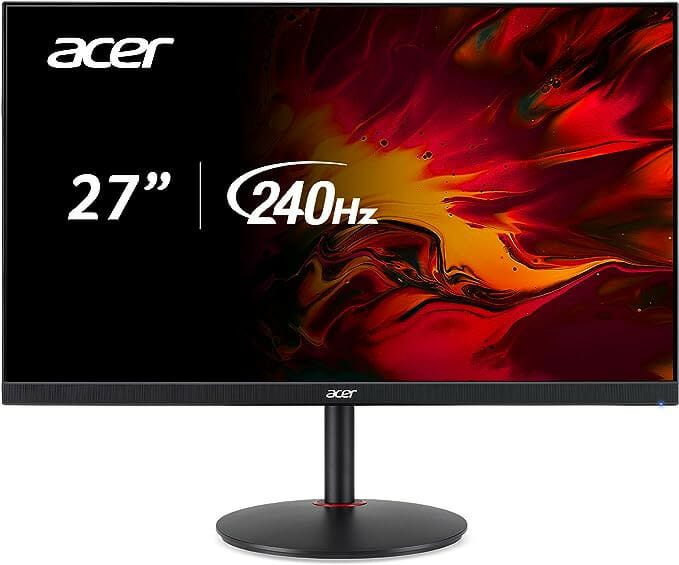
Price: $219.99
The Acer Nitro XV272U is a 27-inch WQHD gaming monitor that also offers features suitable for traders. With a 2560 x 1440 resolution and a fast refresh rate of up to 240Hz, this monitor provides a smooth and responsive display, crucial for tracking rapidly changing financial data.
The AMD FreeSync Premium technology reduces screen tearing and stuttering. The monitor also boasts DisplayHDR 400 certification, ensuring better color and contrast. The IPS panel with a 99% sRGB color gamut provides accurate color representation for detailed chart analysis. The adjustable stand allows traders to position the monitor at a comfortable viewing angle.
Pros: High refresh rate, AMD FreeSync Premium, DisplayHDR 400 certification, accurate color representation with IPS panel.
Cons: The 27-inch screen might be considered smaller for some traders, limiting the number of charts that can be viewed simultaneously.
AOC Agon AG493UCX2 Super Wide Curved Gaming Monitor
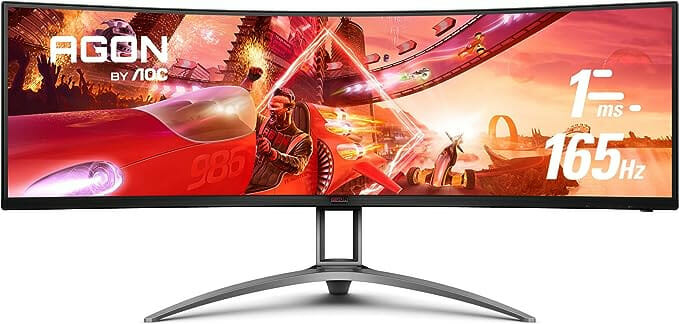
Price: $1099.99
The AOC Agon AG493UCX2 is a super wide curved gaming monitor that can also serve traders well. Its dual QHD resolution of 5120×1440 provides ample screen real estate for displaying multiple charts, data feeds, and trading platforms simultaneously. The 49-inch curved screen enhances immersion and reduces eye strain by ensuring uniform focus across the entire display.
The fast 165Hz refresh rate and 1ms response time deliver smooth motion and responsiveness, which are essential for tracking market movements in real time. FreeSync Premium technology helps prevent screen tearing and stuttering. The DisplayHDR 400 certification ensures improved color accuracy and contrast for better visualization of market trends.
Pros: Super wide curved screen, dual QHD resolution, high refresh rate and fast response time, FreeSync Premium for smooth visuals, DisplayHDR 400 certification for enhanced color and contrast.
Cons: The large screen size might require more desk space, and some traders might prefer a multi-monitor setup for even greater multitasking capabilities.
Also Read ➤➤ Best Screeners for traders
Conclusion
In conclusion, the array of monitors presented offers a diverse selection tailored for various trading needs. The Dell UltraSharp U4919DW showcases its dual QHD curved display and versatile connectivity options, making it ideal for managing multiple financial instruments and data feeds.
However, its 8ms response time might be considered a slight drawback for traders who prioritize real-time market updates. On the other end of the spectrum, the SAMSUNG Odyssey Neo G9 G95NA commands attention with its cutting-edge features such as the 240Hz refresh rate, 1ms response time, and G-Sync/FreeSync compatibility. Yet, its gaming-oriented specifications could outweigh its benefits for trading purposes due to potential overemphasis on speed.
The ASUS ROG Swift PG32UQR balances impressive 4K HDR visuals, G-SYNC compatibility, and a rapid 144Hz refresh rate, making it suitable for traders who appreciate top-tier visual clarity without sacrificing performance. The LG 34WK95U-W, with its UltraWide 5K Nano IPS display, may accommodate a broader workspace and better chart arrangement. However, the potential drawback lies in its 34-inch size, which may limit multitasking for some traders.
The BenQ EW3280U offers a compelling blend of 4K UHD, HDRi technology, and eye-care features, enhancing both data analysis and viewing comfort. Conversely, the Acer Nitro XV272U W2bmiiprx might appeal to those who value high refresh rates for smooth trading motions, but its focus on gaming may overshadow its trading potential. Finally, the AOC Agon AG493UCX2 stands out with its super wide curved display, accommodating an extensive array of trading applications, while its 165Hz refresh rate and FreeSync Premium further ensure smooth performance.
However, its gaming-centric design may detract from the needs of some traders, and its size could pose space challenges. Each monitor offers distinct advantages and trade-offs, ensuring traders can find an optimal fit based on their specific preferences and requirements.



